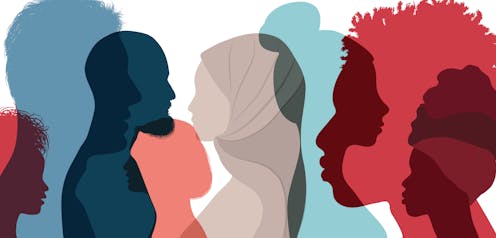Refugee and migrant women are often excluded from mainstream domestic violence services and policy
- Written by Jenny Maturi, Post Doctoral Research Fellow, School of Historical and Philosophical Inquiry, The University of Queensland

In Australia, the discussion around gendered violence is increasingly focused on diversity. However, policy and services continue to be based mostly on the experiences of white, Anglo-settler women.
Our research[1], published in the Journal of Intercultural Studies[2], involved interviews with 31 frontline workers. These workers came from mainstream domestic violence organisations, refugee resettlement organisations, and migrant organisations who support women experiencing violence.
Read more: 'She beams goodness and light': Rosemary's Way is about a hero transforming the lives of migrant and refugee women[3]
Blaming ‘culture’
Our research revealed domestic and family violence in refugee and migrant communities is often racialised and blamed on “culture”.
Some workers indicated “culture” contributed to refugee or ethnic minority women “putting up with” violence, where Anglo-settler Australian women would, apparently, not.
One Anglo-settler worker from a mainstream domestic violence organisation said:
Maybe they’re not used to having freedoms and rights and protection […] I’ve just noticed that women from perhaps African countries or Middle Eastern countries, possibly refugee women […] have a much higher tolerance I would say to violence […] they put up with a lot before reaching out.
When white women seem to “put up with” violence, the conversation is not about their “culture”. Instead, the focus is on what might prevent them from leaving.
That includes economic vulnerabilities and homelessness[4], and fear for their or their children’s safety. It includes worries that the law and police may not be able to protect them[5].
Instead of focusing on systemic problems and broader social inequalities, many blame women’s cultural backgrounds as the reason for them not engaging with mainstream services.
That’s despite evidence[6] migrant and refugee women experiencing violence often encounter particular barriers – such as deportation threats, and financial or language barriers – when they do reach out.
Critiquing the ‘culturally and linguistically diverse’ tag
The category of “culturally and linguistically diverse[7]” reinforces the idea culture is something possessed by foreigners, refugees or ethnic minorities – rather than something all Australians have.
Quite a few service workers used “Australian” to refer to white Anglo-settlers, when actually people of diverse ethnicities and identities[8] are obviously Australian too.
The vague term “culturally and linguistically diverse” can set ethnic and cultural minorities apart from the majority. It can also homogenise them into a single, broad category. This can create the perception a single intervention will work for the entire group.
Domestic violence organisations, even migrant-specific ones, don’t have to collect client data on ethnicity, country of birth or visa pathways. Refugees and migrants are usually categorised simply as “culturally and linguistically diverse”. This limits our understanding of the unique experiences and needs of refugee and migrant women[9].
It’s time we critically reflected on whether the “culturally and linguistically diverse” terminology is still useful[10], or just entrenching inequalities.
Overwhelming small, migrant-led service providers
Instead of integrating diverse perspectives and needs into mainstream services and policy, a range of culturally and linguistically diverse-specific services have emerged.
“Mainstream” (typically Anglo-settler) Australians are usually referred to “mainstream” services. “Culturally and linguistically diverse” peoples are increasingly referred to “culturally and linguistically diverse” services.
Yes, there are few other options for services aiming to tailor support to cultural minorities. But we identified a number of consequences.
This approach seems to deepen assumptions and stereotyping based on “culture”. Workers in migrant services said they had clients referred to them only because the client was not fluent in English (even though all services can engage interpreters).
Some workers from cultural minority heritage said they were expected to take clients from cultural minority backgrounds on the assumption they shared their experiences or history.
Culturally and linguistically diverse-specific services are often small and underfunded compared to mainstream services.
This practice of referring refugee and migrant women can overwhelm smaller, migrant-led services. It also deprives mainstream workers of learning from women from diverse backgrounds.
We should stop referring women based on cultural stereotypes, or assuming that working with refugee and migrant women is not the job of mainstream services.
It’s time for change
Culture is often blamed for domestic violence in refugee and migrant communities.
The category “culturally and linguistically diverse” continues to reinforce assumptions. This contributes to “othering” and can lead to small services being overstretched.
It’s time the voices of refugee and migrant women experiencing domestic violence are heard and recognised in mainstream policies and programs[11]. Policies and services should critically reflect on the cultures and inequalities within mainstream systems.
Read more: Temporary migrants are people, not 'labour'[12]
References
- ^ research (www.tandfonline.com)
- ^ Journal of Intercultural Studies (www.tandfonline.com)
- ^ 'She beams goodness and light': Rosemary's Way is about a hero transforming the lives of migrant and refugee women (theconversation.com)
- ^ economic vulnerabilities and homelessness (theconversation.com)
- ^ able to protect them (www.researchgate.net)
- ^ evidence (www.mcwh.com.au)
- ^ culturally and linguistically diverse (www.researchgate.net)
- ^ people of diverse ethnicities and identities (www.abc.net.au)
- ^ refugee and migrant women (theconversation.com)
- ^ is still useful (www.voced.edu.au)
- ^ recognised in mainstream policies and programs (edspace.american.edu)
- ^ Temporary migrants are people, not 'labour' (theconversation.com)
















